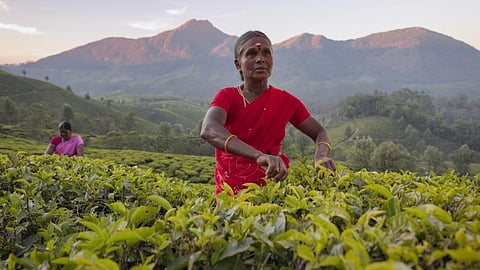Rural women are championing climate resilience in India
In an era dominated by the clamour of urban think tanks and narratives driven by the Global North, the tenacity of India’s rural communities is often overlooked. Yet, to genuinely grasp the essence of climate resilience, one must explore India’s villages and discover the unwavering determination, startlingly inventive solutions and relentless spirit of rural women.
Through centuries of symbiosis with land and sea, rural women have developed an unerring ability to read the climate’s ever-changing moods. From the floodplains of Odisha to the arid expanses of Rajasthan, they’ve been the invisible custodians of agricultural traditions and have adapted and evolved with each climatic challenge.
Their resilience shatters the popular media stereotype that they are mere templates of suffering. When one truly examines their daily lives, they begin to emerge as the true leaders, innovators and guardians of India’s ecological heritage.
Diverse landscapes, unified resolve
In Odisha’s delta, women have resurrected traditional crops including rice varieties that survive submersion in the frequent floods and droughts that occur in the region. Move westward to Maharashtra and the women collectives of Nagpur stand tall, shaping the landscape with indigenous watershed management techniques and turning parched lands into fertile oases.
And in Telangana, rural women have long been the seed guardians that ensure that agricultural traditions live on, safeguarding native seeds against the uncertainties of a changing climate.
Along the sandy shores of coastal Karnataka, fishing is the predominant occupation. However, with rising sea levels and changing marine ecosystems, in the last decade, fisherwomen cooperatives have emerged as the stewards of sustainable fishing.
Using their deep knowledge of the marine environment, they have advocated for regulated fishing practices, ensuring not just the sustainability of marine life but also the livelihood of their communities. Additionally, women self-help groups have initiated mangrove restoration projects, understanding the crucial role these ecosystems play in buffering the harsh impact of rising seas and cyclonic storms.
In coastal Karnataka, urban misconceptions often misrepresent rural women as passive in waste management. In reality, they’re sustainability forerunners. For them, circularity is innate, effortlessly embracing reduce, reuse and recycle. They transform kitchen refuse into compost and ingeniously upcycle materials.
Furthermore, they’ve birthed community collectives championing green waste methods, emphasising waste segregation and recycling. These collectives serve as educational hubs, highlighting eco-friendly disposal. Contrasting urban narratives, rural women aren’t just onlookers; they’re leading change in coastal Karnataka’s waste management paradigm.
The Western Ghats and their rich biodiversity have been deemed to be deeply vulnerable to climatic changes. In the Malnad region of Karnataka, women farmers have taken cognisance of the increasingly erratic rainfall patterns and the importance of biodiversity and have consequently adopted agroforestry.
By intercropping native trees with traditional crops, these farmer communities have enhanced soil fertility, reduced water runoff and ensured a diverse yield throughout the year. By doing so, they are not just combating the vagaries of the changing climate but are also preserving the delicate ecological balance of the Western Ghats.
Power beyond the fields
The influence of these women isn’t restricted to their immediate surroundings. Their determination resonates in community decisions and drives larger movements. They’ve proven that they’re not passive victims but active agents of change.
Their vote, their voice, holds a power that no government should be able to ignore. They have the potential to be beacons for urban India and the Global North, embodying the true resilience that is rooted in understanding, adapting and preserving.
In India, especially in its rural expanses, two narratives unfold side by side: the pressing challenge of climate change and the undeniable rights of women. Yet, the connection between the two remains tenuous, often sidelined by louder discourses.
The potential of our national and local institutions can only truly be realised when we intertwine these threads and broaden our conversations to include the many voices that form the fabric of India. For climate action efforts to truly make a difference across the entirety of our nation, rural areas included, it’s essential that our climate strategies are not just comprehensive but also inherently inclusive.
The chronicles from rural India offer more than just stories; they provide a blueprint for a resilient future. The strength of rural women and their shared wisdom, passed down through generations, holds invaluable lessons on the importance of communal effort in tackling global challenges.
Their collective actions, deeply rooted in the context of their lives and their connection to nature, present a compelling argument for more inclusive, collaborative approaches to building climate resilience.
Divya Hegde is the Founder of Baeru and currently part of the Women Climate Collective, a community seeking to increase the representation of women’s voices and perspectives in the climate conversation.
Views expressed are the author’s own and don’t necessarily reflect those of Down To Earth


